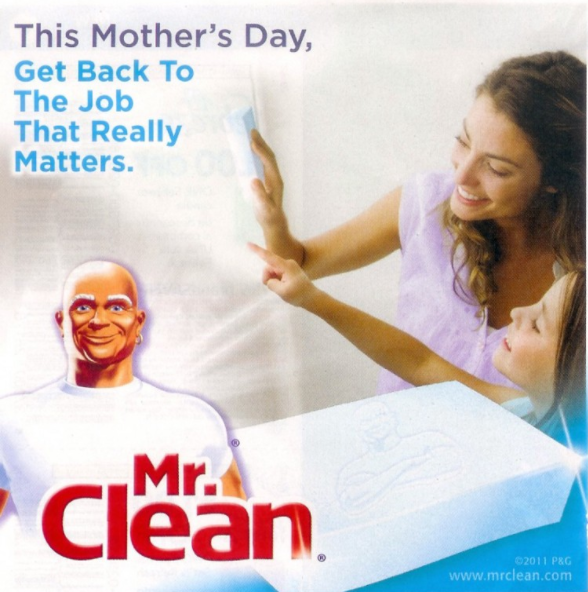
(P&G, 2011)
Advertising is a powerful media that shapes society and our views within it. Athough society has made large strides toward the better in the way women and their roles are portrayed and understood due to various forms of media, the impacts of decades of misogynistic advertising that distorted the United State's perpective of women's roles still linger today. Women, on average, are paid 20% less than men working the same jobs. Women make up about 45% of the workforce at major public companies, but hold only 20% of board seats and 5% of CEO positions.
This glass ceiling between women and men in the workplace is, in part, due to the understanding that a lot of employers and women have of themselves that women are not as competent as men, which has been perpetuated into society by decades of degrading advertising and media towards women. Even today, there are forms of media that still enforce these views.

(P&G, 2011)
The mark left behind by the 1950s era of advertising still shows in media today. Unilever conducted a survey of customers and the portrayal of women in modern advertising, which results show the massive cultural impact that this era left behind.
“40% of women do not recognise the faces being reflected back at them. The study provided a possible explanation; of the women the ads featured, 3% were portrayed in leadership roles, 2% were intelligent, and 1% were funny.”
- Unilever, 2016
However, there can still be hope for the future to eradicate these degrading views of women in media. Just as ads from the 1950s used their influential power to shape societal views for the worse, companies have to power to use the same tactics for the better, to empower women and show the rest of the world that they can do any job at the same quality as anyone else by flipping the decades-long negative stereotypes associated with women and their abilities.

(PPS, Women Acknowledged, 2018)

(PPS, Women Acknowledged, 2018)
“The time is right for us as an industry to challenge and change how we portray gender in our advertising."
- Keith Weed, Chief Marketing Officer for Unilever, 2016